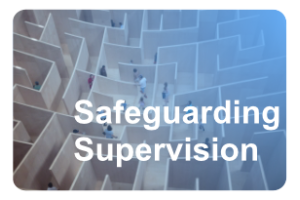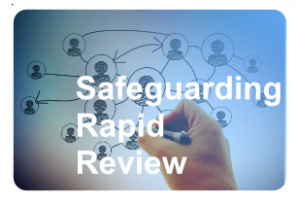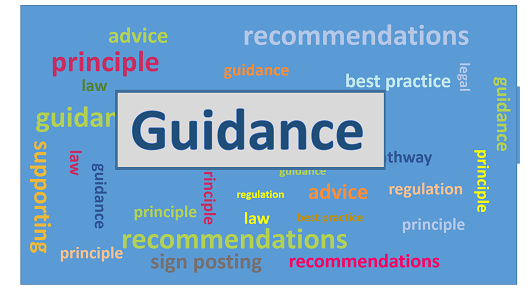Safeguarding News May 2024
Dear Colleague
Welcome to the latest SAFEcic Safeguarding Newsletter, highlighting newsworthy articles that made the headlines during May 2024. Hopefully this will be a welcome distraction from the constant barrage of party political messages dominating the news headlines in the build up to the 2024 General Election!
Free Safeguarding Consultations
Due to record demand for its free safeguarding consultations service, SAFEcic was forced to suspend the offering during April and May. We are pleased to announce that the FREE Safeguarding Consultations are once again available on a first-come, first-served basis. Don't miss out on this opportunity.
Email us at This email address is being protected from spambots. You need JavaScript enabled to view it. to arrange your FREE consultation which offers help and advice on
- Policies and procedures
- Safer recruitment
- Safeguarding training
- Single Central Record
- DBS Checks
- Best practice
- and much more
Safeguarding Supervision
Effective safeguarding Supervision provides support, coaching and training for staff supervision and promotes the interests of children. Supervision will foster a culture of mutual support, teamwork and continuous improvement, which encourages reflection and confidential discussion of sensitive issues.
Supervision will foster a culture of mutual support, teamwork and continuous improvement, which encourages reflection and confidential discussion of sensitive issues.
To find out more, email This email address is being protected from spambots. You need JavaScript enabled to view it.
*** New Service: Single Central Record (SCR) Audits
SCR audits of HR files can be delivered either on site or remotely and typically take one day and involve dip sampling the SCR and a minimum of 12 files for a range of posts including senior management, staff, volunteers and contractors recruited over time.
All evidence is triangulated comparing the information in the HR files against the details recorded on the SCR throughout the entire recruitment process in line with the requirements, as relevant to the organisation, of the Rehabilitation of Offenders Act 1974 (as amended 2013, 2020 and 2023), Part 5 of the Police Act 1997, Safeguarding Vulnerable Groups Act 2006, Child Care Act 2006, Section 128 of the Education and Skills Act 2008, The Immigration Act 2014, Keeping Children Safe in Education, Ofsted, the CQC and other regulators.
You will receive a comprehensive report including findings, general remarks and examples of good practice. Actions are graded for priority in an action plan outlining next steps with appropriate timeframes.
An SCR audit will support you in ensuring compliance and best practice in Safer Recruitment.
For pricing and further information, please email This email address is being protected from spambots. You need JavaScript enabled to view it..
Safeguarding Rapid Review Service
SAFEcic's Rapid Review Service is a proven, cost-effective and efficient way for busy managers, directors and trustees across many sectors (including Ofsted, CQC and Charity Commission regulated organisations) to gain external, expert insight and support to help their organisation attain the highest level of safeguarding culture, policy, procedures and practice.
organisations) to gain external, expert insight and support to help their organisation attain the highest level of safeguarding culture, policy, procedures and practice.
A Rapid Review takes just two hours of management time via Zoom or Teams and the price includes preparation of a high-level assessment report and an action plan to efficiently and cost effectively address any identified issues. Find out more or book a Rapid Review
Training Schedule
Our latest training schedule is listed below and feel free to share this email with your colleagues and they too can join our newsletter database.
To sign up simply click here.
SAFEcic Blended Learning Training Calendar
Leading on Child and Adult Safeguarding
Safeguarding Training, Leading on Child and Adult. Online course plus Zoom
Thu 18 July 2024
10:30 - 12:00 GMT
Safeguarding Training, Leading on Child and Adult. Online course plus Zoom
Tue 6 Aug 2024
10:30 - 12:00 GMT
Safeguarding Training, Leading on Child and Adult. Online course plus Zoom
Wed 11 Sept 2024
10:30 - 12:00 GMT
Safeguarding Training, Leading on Child and Adult. Online course plus Zoom
Thu 3 Oct 2024
10:30 - 12:00 GMT
Safeguarding Training, Leading on Child and Adult. Online course plus Zoom
Tue 5 Nov 2024
10:30 - 12:00 GMT
Safeguarding Training, Leading on Child and Adult. Online course plus Zoom
Wed 4 Dec 2024
10:30 - 12:00 GMT
Standard Child and Adult Safeguarding
Safeguarding Training, Standard Child and Adult. Online Course plus Zoom
Tue 2 July 2024
10:30 - 12:00 GMT
Safeguarding Training, Standard Child and Adult. Online Course plus Zoom
Thu 19 Sept 2024
10:30 - 12:00 GMT
Safeguarding Training, Standard Child and Adult. Online Course plus Zoom
Tue 26 Nov 2024
10:30 - 12:00 GMT
Safeguarding: Trustees’ legal responsibilities
Safeguarding: Trustees' legal responsibilities. Online Course plus Zoom
Tue 2 July 2024
10:00 - 11:30 GMT
Safeguarding: Trustees' legal responsibilities. Online Course plus Zoom
Wed 25 Sept 2024
10:00 - 11:30 GMT
Safeguarding: Trustees' legal responsibilities. Online Course plus Zoom
Tue 15 Oct 2024
10:00 - 11:30 GMT
Safeguarding: Trustees' legal responsibilities. Online Course plus Zoom
Tue 3 Dec 2024
10:00 - 11:30 GMT
Safer Recruitment Training. Online course plus 2 Hr Live Online training
Thu 11 July 2024
10:00 - 12:00 GMT
Safer Recruitment Training. Online course plus 2 Hr Live Online training
Tue 24 Sept 2024
10:00 - 12:00 GMT
Safer Recruitment Training. Online course plus 2 Hr Live Online training
Wed 6 Nov 2024
10:00 - 12:00 GMT
Managing and Leading on International Safeguarding
Managing and Leading on International Safeguarding Training. Online course plus Zoom
Tue 10 Sept 2024
10:00 - 11:30 GMT
SAFEcic's free hub resources by setting are available through the SAFEcic.co.uk main menu. Alternately you can bookmark the links below:
Education | Dental | Charities | GP & Primary Medical Services | Fath Groups | Entertainment & Leisure | Working Overseas |
Good Practice Guidance

Education
New age ratings to be introduced on Relationships, Sex and Health Education content in schools to ensure it is appropriately and sensitively taught.
Following multiple reports of disturbing materials being used in Relationships, Sex and Health Education (RSHE) lessons, the Department for Education (DfE) has published updated guidance that will ensure content is factual, appropriate and that children have the capacity to fully understand everything they are being taught.
Parents will have the right to see the resources that are being used to teach their children about relationships, health and sex in all circumstances and new age limits will be introduced so that children are not introduced to content they may not have the maturity to understand. Sex education will not be taught before Year 5, and at that point from a purely scientific standpoint.
The contested theory of gender identity will not be taught and the guidance confirms copyright law should not be a barrier to sharing curriculum materials with parents – with the updated curriculum open for an eight week consultation closing 11th July 2024
New content in the guidance, mirroring letters sent by the Education Secretary to schools over the past year, makes it clear that schools should make materials available to parents, and clarifies how copyright legislation gives them scope to do so.
The guidance also now includes additional content on suicide prevention in the secondary health and wellbeing section, including equipping pupils to recognise when they or their peers need help.
The guidance has also been strengthened to help young people to understand the benefits of rationing time spent online and the impact on their wellbeing, and the serious risks of viewing content that promotes self-harm and suicide.
Following reports of schools seeing rising levels of harmful misogynistic behaviour, the guidance now includes a dedicated section on sexual harassment and sexual violence, which covers some specific types of abusive behaviour that were not explicitly discussed previously, such as stalking, as well as advice for teachers about how to address misogynistic online influencers.
Briefing Papers, Inquiry and Review Reports

1 Safeguarding children in elective home education
This briefing paper from the Child Safeguarding Practice Review Panel is part of an ongoing series of publications to share information arising from work undertaken by the panel. The purpose of this briefing is to share learning from analyses of rapid reviews and local child safeguarding practice reviews (LCSPRs) to inform the work of safeguarding partners.
The briefing explores common themes and patterns identified across reviews and highlights practice issues raised by safeguarding partners from across England.
2 Pioneer's Response to the Independent Review of past and present Ministry Practices
The independent review of Pioneer’s past and present ministry practices led by Christian Safeguarding Services (CSS) has been published. The report provides evidence of a pattern where Gerald Coates’ ministry and pastoral practice fell well short of expected standards and where appropriate boundaries were not respected. This accelerated in the last decade of Gerald’s life, after he had handed on the leadership of Pioneer and after he had written a book called ‘Sexual Healing’ which then became a significant focus of his ministry.
3 AI in the family justice system
The briefing paper set out to prompt discussion and reflection about how artificial intelligence has the potential to improve experiences for families and professionals accessing the family justice system. It also outlines the challenges and risks involved and discusses options for governance supporting safe and fair usage.
The paper is focused on three potential areas for using AI, improving families’ experiences, enabling administrative efficiencies and supporting decision making.
It also raises some challenges and risks – such as fairness, accountability, privacy, transparency and accuracy – and ends with a discussion around regulation and governance.
Research Reports, Consultations, Campaigns and Studies

1 Consultation to strengthen safeguards for child strip search including the requirement to notify parents and guardians when a child is strip searched.
The government has proposed a number of measures to strengthen protections in place for children and vulnerable people subject to a strip search that involves the exposure of intimate parts prior to arrest, as well as following detention.
The changes to the Police and Criminal Evidence Act 1984 (PACE) Codes of Practice A and C, which the government is seeking views on, include proposals that would require a senior officer, of the rank of inspector or above, to authorise any search of a child or vulnerable person is strip searched. This will apply to stop and search and searches in custody.
Greater clarity will also be given to existing safeguards, such as introducing requiring that an appropriate adult of the opposite sex may only be present if known to the detainee and the detainee agrees.
The plans, which will ensure officers have the confidence to use these powers if necessary, while being able to hold them to account effectively, come after several high-profile cases in recent years where children were intrusively searched in ways that have caused trauma and raised safeguarding concerns.
Whilst there are strict rules already in place to govern how this power is used, more needs to be done to ensure the welfare and dignity of the individual being searched is protected and to provide clarity to the police on their use.
Following the Child Q case, reviews conducted by the Independent Office for Police Conduct, the Strip search of children in England and Wales | Children's Commissioner for England (childrenscommissioner.gov.uk) and the City and Hackney Safeguarding Partnership found that too often when strip searches involving the exposure of intimate parts are conducted, safeguarding and child protection have not been sufficiently prioritised.
Further changes being proposed to ensure there is consistency in the use of this police power include:
- a requirement that if there is any reason to suspect the individual being searched is under 18, they are treated as a child
- an explicit reference to the safeguarding needs of children subject to an intimate search, and the potentially traumatic impact that the search may have
- a new requirement to notify an officer of the rank of at least superintendent following an intimate search of a child or vulnerable person where because of urgency, an appropriate adult was not present
- a clarification that appropriate adults of the opposite sex can only be present during strip search if known to the detainee
2 Limitation law in child sexual abuse cases: consultation open
This consultation paper seeks views on options for the reform of the law of limitation in child sexual abuse cases in England and Wales. Specifically, it considers the recommendation by the Independent Inquiry into Child Sexual Abuse (‘the Inquiry’) on limitation law. It also examines the law of limitation in child sexual abuse cases in other jurisdictions examined by the Inquiry and seeks views on options, other than removal of the limitation period, for reform of limitation law in child sexual abuse cases. The consultation closes 11th July 2024
3 2024 Appropriate filtering and monitoring definitions published
Following a public consultation, The UK Safer Internet Centre (UKSIC) has published its ‘appropriate’ filtering and monitoring definitions for 2024. The definitions help both schools and providers understand what is considered ‘appropriate’.
Alongside the DfE’s introduction of statutory guidance, UKSIC first published its filtering and monitoring definitions in 2016 to help both schools and providers understand what should be considered as ‘appropriate’. The DfE also published further guidance highlighting new Filtering and Monitoring Standards in March 2023.
Included alongside the 2024 version are documents summarising the substantive changes introduced from 2023:
Appropriate Filtering for Education Settings
Appropriate Filtering for Education Settings (Tracked Changes)
Appropriate Monitoring
Appropriate Monitoring (Tracked Changes)
Schools and providers can obtain further help and support from the Professionals Online Safety Helpline.
Regulators

UK's Communications Regulator (Ofcom)
1 Ofcom’s proposed measures to improve children's online safety
Ofcom is setting out proposed steps online services would need to take to keep children safer online, as part of their duties under the Online Safety Act 2023. Under the Act social media apps, search and other online services must prevent children from encountering the most harmful content relating to suicide, self-harm, eating disorders, and pornography. They must also minimise children’s exposure to other serious harms, including violent, hateful or abusive material, bullying content, and content promoting dangerous challenges. Online services must establish whether children are likely to access their site – or part of it. And secondly, if children are likely to access it, the company must carry out a further assessment to identify the risks their service poses to children, including the risk that come from the design of their services, their functionalities and algorithms. They then need to introduce various safety measures to mitigate these risks.
The consultation closes 17th July 2024
Care Quality Commission (CQC)
2 CQC takes action to protect people at Cambridgeshire GP
The Care Quality Commission (CQC) has reduced the rating of Parson Drove Surgery from good to inadequate, and placed it into special measures to protect people following an inspection in January.
This inspection was carried out to follow up on safety concerns people had raised to CQC.
As well the surgery’s rating dropping overall, it has also dropped from good to inadequate for safe, effective, and well-led. It has dropped from good to requires improvement for caring and responsive. The service is now in special measures to focus its attention on making rapid and widespread improvements, and it will be kept under close review by CQC during this time to make sure people are safe. CQC have also taken further regulatory action to protect people and will report on this when legally able to do so.
Inspectors found:
- The surgery didn’t have effective safeguarding processes in place. The surgery hadn’t completed a child’s safeguarding referral after concerns were first raised. This referral was only completed after inspectors raised this
- Leaders didn’t have enough oversight of opioid prescribing at the surgery, which had one of the highest opioid prescription rates in England. This put people at risk of developing harmful dependencies. They introduced new opioid prescribing and opioid reduction policies after this inspection
- The surgery hadn’t completed risk assessments including fire safety, infection prevention, or for equipment to keep people safe. The provider has implemented these after this inspection.
- People’s responses in the GP patient survey showed a decline in areas such as accessing appointments, trust, and feeling listened to over the past few years at the surgery. The surgery wasn’t seeking out people’s feedback on their own.
Online Safety

Action Fraud issue warning as WhatsApp group chats are targeted by fraudsters
WhatsApp group chat members are being warned they could be targeted by criminals, as Action Fraud reveals it has received 636 reports from victims of the messaging app this year.
The fraud often begins when a member of the group receives a WhatsApp audio call from the fraudster, pretending or claiming to be another member of the group. This is done to gain the individual’s trust, and often the scammer will use a false profile picture and/or display name, so at first glance it would appear to be a genuine member of the group.
The fraudster will tell the victim they are sending them a one-time passcode which will allow them to join an upcoming video call for group members. The criminal then asks the victim to share this passcode with them so they can be “registered” for the video call.
In reality, the criminal is asking for a registration code to register the victim’s WhatsApp account to a new device so they can take over their account.
Once the fraudster has access to the victim’s WhatsApp account, they will enable two-step verification which makes it impossible for the victim to regain access their account. Other members of the group, or friends and family in the victim’s contacts, will then be messaged asking them to transfer money urgently as they are in desperate need of help.
What can you do to avoid being a victim?
- Set up two-step verification (2SV) to give an extra layer of protection to your account.
- Tap Settings > Account > Two-step verification > Enable.
- CALL. If a family member or friend makes an unusual request on WhatsApp, always call the person outside of WhatsApp to confirm their identity.
- Report spam messages or block a sender within WhatsApp. Press and hold on the message bubble, select ‘Report’ and then follow the instructions.
If you live in England, Wales and Northern Ireland and have been a victim of fraud or cybercrime, report it at Action Fraud or by calling 0300 123 2040. In Scotland, victims of fraud and cybercrime should report to Police Scotland on 101.
Worthy of Note

1 National Autistic Society Garden to raise awareness of masking at RHS Chelsea
The charity is aiming to raise awareness of autism and masking with a show garden at the world famous RHS Chelsea Flower Show. The garden is a collaboration between the charity and co-designers Sophie Parmenter, and Dido Milne, Director of CSK Architects.
After this year’s show, the garden will be relocated to one of their supported living sites at Catrine Bank alongside the river Ayr in Scotland.
Masking is a strategy used by some autistic people, consciously or unconsciously, to appear non-autistic in order to fit in and be accepted in society. However, masking can come at a great cost for autistic people because it relies on suppressing natural behaviours and instincts, needs, preferences and coping mechanisms, which can result in exhaustion, mental health difficulties, a loss of sense of self and low self-esteem.
The show garden seeks to represent autistic masking and how autistic people experience this in different parts of their lives. Walls or ‘masks’ of timber and cork create a series of spaces dedicated to different types of social interaction.
2 Eight-year ban for director of Scottish nuisance cold-calls firm
The director of a company which made millions of cold-calls has been banned from running a business for eight years. Duncan Paul, 51, was the director of CRDNN Limited, which rang homes and businesses with unsolicited sales calls in 2018. Many of the calls were about window scrappage, debt management, window, conservatory and boiler sales while others falsely claimed to be working with Scottish and UK government energy saving schemes. In one case, calls made to a Network Rail control centre near Fort William clogged up the line, creating potential safety problems. The firm, based in Clydebank, Dunbartonshire, was fined the maximum £500,000 by the Information Commissioner’s Office in 2020 but went into liquidation without paying the fine. Paul’s co-director Stephen Foote, 44, was also banned as a director for eight years in January 2023.
The undertakings prevent the two from being involved in the promotion, formation or management of a company, without the permission of the court.
3 Man prosecuted for working unlicensed as a school security guard
The case began when West Mercia Police told the SIA that they had charged Mr Richardson with a criminal offence. SIA investigators wrote to Richardson on 23 September 2022 to inform him that they were suspending his licence due to the charges being brought against him. Richardson had in addition breached his licence conditions by failing to declare the pending prosecution to the SIA. On 25 January 2023, West Mercia Police informed the SIA that a court had sentenced Richardson for the criminal offence.
As part of the licence suspension, the SIA required Richardson to return his SIA licence immediately, which he failed to do. The SIA sent two subsequent suspension review letters to his address. Richardson had moved house, but failed to inform the SIA, which was also a breach of his licence conditions.
Despite his suspension, Richardson continued working as an unlicensed security guard at a school for almost two months, until SIA regional investigators informed the staff that he did not hold a valid SIA licence. He was paid for the shifts that he worked while unlicensed and didn’t inform his employer. He knew that he wouldn’t be able to carry out a licensable role and earn money if he declared his SIA licence suspension.
Worcester Magistrates’ Court sentenced Steven Richardson to a 12-month community order, with a 120-hour unpaid work requirement, and ordered him to pay a victim surcharge of £144 plus court costs of £500, amounting to a total of £644.
4 Nursery worker guilty of manslaughter following death of nine-month-old baby
A nursery worker has been found guilty of the manslaughter of a nine-month-old baby in her care. Kate Roughley, 37, from Stockport, denied being responsible for the death of Genevieve Meehan, who died after being left face down, tightly swaddled and strapped to a bean bag for more than 90 minutes at Tiny Toes nursery in Cheadle Hume, Stockport. Police and paramedics were called to Tiny Toes Day Nursery on 9 May 2022 following reports of an unresponsive baby. When they arrived, at around 3.20pm, Genevieve was not breathing. Despite the best efforts of the police and paramedics at the scene, and later the medical staff at Stepping Hill Hospital, Genevieve could not be revived.
A police investigation began to establish the cause of Genevieve’s death. Roughley, who was in charge of the nursery’s baby room that day, misled police officers at the scene, claiming she had checked on Genevieve regularly, at least every five minutes. CCTV footage showed adequate checks were not made and that Roughley had failed to make safe sleep arrangements for her.
Genevieve had been left for more than 90 minutes with minimal, if any, supervision. Roughley deliberately ignored her cries and struggles as she lay unable to move, face down on the bean bag. There were multiple opportunities for Roughley to have prevented Genevieve’s death. The footage from the days leading up to her death contained clear examples of Roughley’s ill-feeling towards Genvieve. Roughley, who had 17 years’ experience as a caregiver, showed no genuine care or compassion towards her. She was heard singing: “Genevieve go home” and referred to her as “vile”. National guidelines, nursery guidelines and product information were all ignored.
Following the guilty verdict on 20 May 2024, on 22 May 2024. Roughley was sentenced to 14 years in prison
Reasons to Remain Vigilant in All Aspects of Safeguarding

1 Call for the public to "ACT Early" following arrest of 14-year-old boy for terrorism offence
A 14-year-old boy has been arrested as part of an investigation by the Met’s Counter Terrorism Command.
The boy was arrested on Wednesday 22 May at an address in west London on suspicion of possessing information of a kind likely to be useful to a person committing or preparing an act of terrorism. The 14-year-old boy was taken to a west London police station and was later released on bail to a date in early August pending further enquiries. The investigation is related to extreme right-wing terrorist material. As part of the investigation, officers also carried out a search at an address in west London and enquiries remain ongoing.
Anyone with concerns about somebody who may be vulnerable to radicalisation can visit the ACT Early where there is advice, guidance and support available. This includes information on the warning signs to look out for, as well as tips about what to do and what not to do if you think somebody may be being radicalised.
You can also call the ACT Early Support Line between 9am and 5pm daily on 0800 011 3764, in confidence, to share your concerns with our specially trained officers.
2 Man responsible for extreme body modifications has been jailed
A criminal network who conducted extreme body modifications and illegal surgeries have been jailed after Met detectives uncovered their horrendous crimes. Specialist Met officers leading a unique investigation into the extreme body modification of men have seen seven men jailed for a total of 79 years after a hearing at the Old Bailey.
Met detectives launched an investigation into the illegal surgical procedures after a victim was first identified by Devon and Cornwall Police in November 2020 after it was established the offending had taken place in North London.
Marius Theodore Gustavson, 46, of Haringey was identified by detectives as being the primary offender following a lengthy and complex investigation. Alongside the six other men, he was jailed for life with a minimum tariff of 22 years for:
- Conspiring to commit grievous bodily harm
- Five counts of causing grievous bodily harm with intent
- One count of making an indecent photograph of a child
- One count of distributing an indecent photograph of a child
- Possession of extreme pornographic images
- Distributing indecent pseudo images of children
3 High school teacher guilty of child sex offences against pupils
Source: Crown Prosecution Service (CPS) Published on this website Monday 20 May 2024
A teacher has been found guilty of child sex offences against two pupils at the school where she worked. Rebecca Joynes, 30, who taught at a Manchester high school, claimed there was no sexual contact between her and the first schoolboy and claimed sexual contact did not take place with the second boy until he was 16 and after she had been dismissed from the school.
On 15 October 2021, after Joynes arranged for a 15-year-old boy to stay overnight at her home, she took him to the Trafford Centre where she bought him a £345 belt. They then returned to her flat and engaged in sexual intercourse. When she was arrested, she made no comment in her police interview. She was then charged with sexual activity with a child and suspended from her teaching job.
Whilst suspended and on bail in respect of those offences, a second 15-year-old boy was targeted by Joynes. The pair engaged in a sexual relationship, which only ended when Joynes became pregnant. Once again Joynes refused to comment when interviewed by police. Joynes later admitted that she became involved with the first boy after she gave him most of the digits of her phone number and he guessed the rest. She denied that any sexual contact had taken place between them.
She admitted that the second boy had been to her flat when he was 15 but claimed no sexual contact took place until he had reached the age of 16 and she no longer worked at the school. Following a nine-day trial at Manchester Crown Court, Joynes was found guilty of six sexual offences against the two boys. Sentencing will take place on 4 July 2024.
4 Operation Stovewood: Rotherham taxi driver guilty of raping two young girls
A former taxi driver has been found guilty of committing child sex offences against two underage girls during the 2000s.The CPS prosecuted Adam Ali, 43, as part of Operation Stovewood, a major National Crime Agency investigation into non-familial child sexual abuse and exploitation which took place in Rotherham, South Yorkshire, between 1997 and 2013. Ali, formerly known as Razwan Razaq, was found guilty of seven charges following a trial at Sheffield Crown Court on Thursday, 23 May 2024.
The offences against the two victims took place between 2001 and 2004. Each incident involved the defendant getting the victims into his taxi or car before assaulting them. One victim was routinely assaulted and raped by Ali during a one-year period. Ali gave the victim lifts in his taxi and would expect her to perform sexual acts in return. If the victim refused, Ali would threaten to drive the victim to unknown locations and leave her stranded if she did not comply.
Ali was previously sentenced to 11 years imprisonment in 2010 after being convicted of committing offences of a similar nature.
And Finally
Sun Safe Schools is a FREE national accreditation programme developed by national skin cancer awareness charity SKCIN.
Skcin - The Karen Clifford Melanoma and Skin Cancer Charity is now celebrating over 10 years of embedding sun safety into primary education and reaching over 1 million children and their families nationwide – the programme provides primary schools with all the FREE tools and resources they need to assist them in their duty of care to provide a sun safe environment and prevent skin cancer through education.
You can find out more by watching the Sun Safe Schools accreditation promotional video and reading the leaflets Sun Safe Schools and Sun Safe Nurseries



